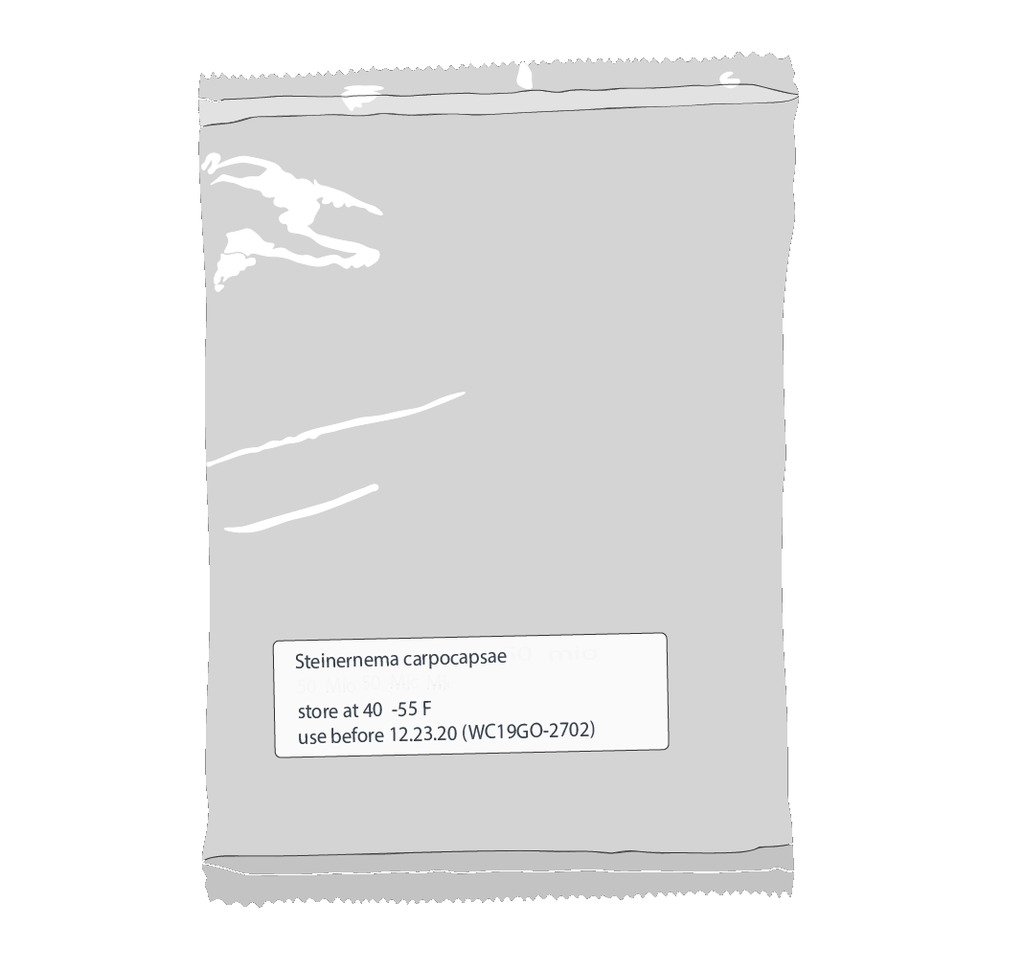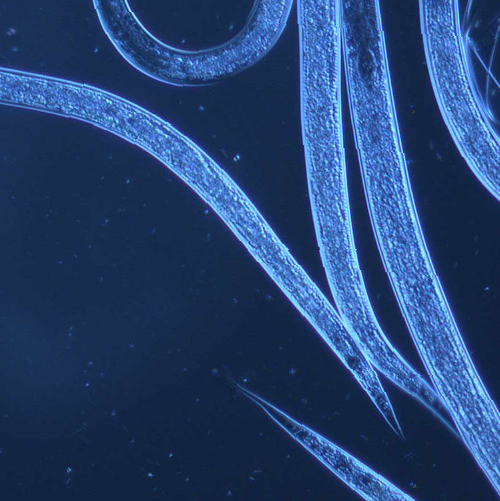BioBee BioSC - Steinernema carpocapsae nematode (250,000,000 nematodes / bag)
130-110-03-172048250
Availability:
backordered
Shipping time if backordered::
jusqu'à 2 semaines
In case of backorder::
Only replenished IF YOU ORDER IT
MAIN TARGETS
Turf pests including:
- billbug (snout beetle, Sphenophorous)
- flea
- cutworm (Agrotis)
- armyworm (Spodoptera)
- sod webworm (Crambus)
- crane fly (Tipula paludosa and Tipula oleracea)
- etc.
Orchard, ornamental and vegetable pests including:
- black vine weevil (Otiorhynchus sulcatus) also known as the taxus weevil or cyclamen grub
- codling moth (Cydia pomonella)
- citrus root weevil (Diaprepes abbreviatus), also known as the citrus root borer or chichi in Spanish
- pepper weevil (Anthonomus eugenii)
- red palm weevil (Rhynchophorus ferrugineus), also known as palm weevil, Asian palm weevil or Sago Palm Weevil
- strawberry root weevil (Otiorhynchus ovatus)
- false codling moth (FCM, Thaumatotibia (Cryptophlebia) leucotreta)
- tomato leaf miner (Tuta absoluta), also known as the tomato pinworm and South American tomato moth
- peach tree borer (Synanthedon exitiosa)
- banana moth (Opogona sachari)
- cranberry girdler (Crambus hortuellus)
- dogwood borer (Synanthedon scitula) and other clearwing borer species
- shore flies (Scatella)
- etc.
ADDITIONAL TARGETS
-
TIPS
Use the correct nematode species for the target pest. Nematodes can be kept refrigerated for several weeks until needed.
PRODUCT DESCRIPTION & PACKAGING
BioSc is an Entomopathogenic nematode containing infective juveniles of Steinernema carpocapsae in an inert carrier.
Nematodes actively search for larvae. After locating pest larvae, nematodes invade through natural body openings and inject bacteria into the insect. Bacteria develop within the insect and it dies of septicaemia after 2-3 days. Nematodes reproduce inside the dead larva. Thousands of new nematodes leave the dead larva and search for further prey.
These tiny roundworms parasitize various insect pests living in the soil, leaves and sometimes trees. Beneficial nematodes are used as bio-control agents in turf, vegetables, flower gardens, orchards, vineyards and greenhouses.
They are diluted with water and can be applied via a spray or drench.
BioSc is packed in infective juveniles (third stage) in an inert carrier.
Although BioSc is compatible with most fungicides and insecticides, tank mixing is not recommended.
Simultaneous use of Nematicides must be avoided.
STORAGE
- Storage temperature: 4-8°C (39-46°F)
- Do not store in sunlight
- Apply early morning or late afternoon
- Do not freeze
APPLICATION
- BioSc can be applied as a drench, through micro-irrigation and with a spray application.
- For optimum results it should be either applied early morning or late evening to minimize the effect of heat and sunlight.
- The soil surface should be moist at the time of application and it’s recommended to maintain the soil moist for 3-4 weeks after application.
- Dosage of application depends on the pest pressure.
The amount and frequency of the application (introduction rate) is determined by the target crop, level of infestation, weather conditions and damage inflicted to the crop.
DISCLAMER
Before combining this product with any chemical pesticide in the crop, please consult your BioBee technical field representative.
BioBee Sde Eliyahu Ltd. produces and markets biological products. Production is carried out using innovative techniques under controlled quality assurance standards such as ISO 9001:2015, as well as IOBC’s international standards for mass-production of insects. All products are tested to meet specification requirements before leaving the factory.
The success of biological pest control is affected by the crop’s initial pest population (upon application of the product), weather conditions and chemical residue present in the crop, among other possible aggravating factors.
Under no circumstance shall BioBee or Groupe Horticole Ledoux inc. be liable for the outcome of the implementation in the field, as it has no control over local conditions, the application method, or the possible improper treatment/storage of the product.
Specifications
| Instruction / | delivery |
MAIN TARGETS
Turf pests including:
- billbug (snout beetle, Sphenophorous)
- flea
- cutworm (Agrotis)
- armyworm (Spodoptera)
- sod webworm (Crambus)
- crane fly (Tipula paludosa and Tipula oleracea)
- etc.
Orchard, ornamental and vegetable pests including:
- black vine weevil (Otiorhynchus sulcatus) also known as the taxus weevil or cyclamen grub
- codling moth (Cydia pomonella)
- citrus root weevil (Diaprepes abbreviatus), also known as the citrus root borer or chichi in Spanish
- pepper weevil (Anthonomus eugenii)
- red palm weevil (Rhynchophorus ferrugineus), also known as palm weevil, Asian palm weevil or Sago Palm Weevil
- strawberry root weevil (Otiorhynchus ovatus)
- false codling moth (FCM, Thaumatotibia (Cryptophlebia) leucotreta)
- tomato leaf miner (Tuta absoluta), also known as the tomato pinworm and South American tomato moth
- peach tree borer (Synanthedon exitiosa)
- banana moth (Opogona sachari)
- cranberry girdler (Crambus hortuellus)
- dogwood borer (Synanthedon scitula) and other clearwing borer species
- shore flies (Scatella)
- etc.
ADDITIONAL TARGETS
-
TIPS
Use the correct nematode species for the target pest. Nematodes can be kept refrigerated for several weeks until needed.
PRODUCT DESCRIPTION & PACKAGING
BioSc is an Entomopathogenic nematode containing infective juveniles of Steinernema carpocapsae in an inert carrier.
Nematodes actively search for larvae. After locating pest larvae, nematodes invade through natural body openings and inject bacteria into the insect. Bacteria develop within the insect and it dies of septicaemia after 2-3 days. Nematodes reproduce inside the dead larva. Thousands of new nematodes leave the dead larva and search for further prey.
These tiny roundworms parasitize various insect pests living in the soil, leaves and sometimes trees. Beneficial nematodes are used as bio-control agents in turf, vegetables, flower gardens, orchards, vineyards and greenhouses.
They are diluted with water and can be applied via a spray or drench.
BioSc is packed in infective juveniles (third stage) in an inert carrier.
Although BioSc is compatible with most fungicides and insecticides, tank mixing is not recommended.
Simultaneous use of Nematicides must be avoided.
STORAGE
- Storage temperature: 4-8°C (39-46°F)
- Do not store in sunlight
- Apply early morning or late afternoon
- Do not freeze
APPLICATION
- BioSc can be applied as a drench, through micro-irrigation and with a spray application.
- For optimum results it should be either applied early morning or late evening to minimize the effect of heat and sunlight.
- The soil surface should be moist at the time of application and it’s recommended to maintain the soil moist for 3-4 weeks after application.
- Dosage of application depends on the pest pressure.
The amount and frequency of the application (introduction rate) is determined by the target crop, level of infestation, weather conditions and damage inflicted to the crop.
DISCLAMER
Before combining this product with any chemical pesticide in the crop, please consult your BioBee technical field representative.
BioBee Sde Eliyahu Ltd. produces and markets biological products. Production is carried out using innovative techniques under controlled quality assurance standards such as ISO 9001:2015, as well as IOBC’s international standards for mass-production of insects. All products are tested to meet specification requirements before leaving the factory.
The success of biological pest control is affected by the crop’s initial pest population (upon application of the product), weather conditions and chemical residue present in the crop, among other possible aggravating factors.
Under no circumstance shall BioBee or Groupe Horticole Ledoux inc. be liable for the outcome of the implementation in the field, as it has no control over local conditions, the application method, or the possible improper treatment/storage of the product.
| Order-driven inventory |

















